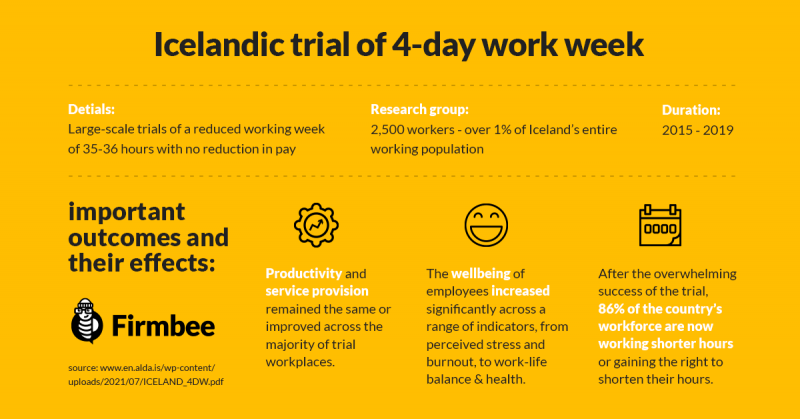Are the days of the full five-day work week coming to an end? Recent media stories and research emerging about the benefits of a four day work week have raised some eyebrows, with a few companies already implementing this solution. Shorter work weeks claim to offer increased productivity, employee health and wellness, and greater workplace culture. Is the shortened work week all that it’s cracked up to be – and should your workplace think about implementing this new work schedule?
Is a four day work week on the horizon?
- What’s the deal with the 4-day work week?
- The benefits of a 4-day work week
- Are There Cons to a 4-day Work week?
- How Can You Start a 4-Day Work week?
- Will your company start a four day work week?
What’s the deal with the 4-day work week?
The four day work week isn’t necessarily a new topic, but recent reports from Iceland have brought the concept of a short work week into the spotlight once more.
From 2015 and 2019, researchers in Iceland tracked workplaces that shifted from a 5-day to a 4-day work week.
 source: https://en.alda.is/wp-content/uploads/2021/07/ICELAND_4DW.pdf
source: https://en.alda.is/wp-content/uploads/2021/07/ICELAND_4DW.pdf
The findings, in short, showed that companies that allowed workers to shift their weekly work hours reported higher productivity, superb work quality, and an overall boost in their physical and mental health. Most importantly, companies found that happier employees were more loyal and hardworking.
The research results were so startling that unions began to renegotiate their employee working patterns across the board. Now, researchers are reporting that 86% of Iceland’s workforce have either moved to shorter hours for the same pay or will soon be there.
If your’re really interested in the topic, we encourage you to read the whole report where you can find more information regarding the background of the trial, key stats, the existing evidence, and the full time line of events. The publication also shows the managers’ perspective, which may be very interesting for team leaders.
The benefits of a 4-day work week
A four day work week could benefit both employers and employees – and lead to much higher financial and brand success. Here are a few reasons why:
Provides a healthier, more productive Icelandic workforce A reduced work schedule has been shown to increase employee health and wellness and have positive effects on the workplace culture.
Allows more time for productivity
With fewer hours worked per week, employees have more time to be productive. Whether they take additional breaks during the day or leave earlier, there is a higher quality of work in less time spent at work.
Encourages creative thinking
If employees are happier with their lives outside of work, they will have more energy and creativity to put into projects and find solutions for their employers.
Boosts company culture
Allowing workers to have more time at home with their families gives them an opportunity to relax and enjoy themselves outside of the workplace. They are likely to return refreshed, ready for work.
Encourages employees to be healthy
Improved employee health leads to fewer sick days taken (and if you’re a freelancer who doesn’t have a work schedule, this one is good for you!)
Increases loyalty
Employees who are happy with their work-life balance are generally less likely to be looking for new jobs. They tend to be more loyal and go the extra mile for any company that treats them well.
Are There Cons to a 4-day Work week?
While the research shows that the 4-day work week can benefit employees and employers, it also has some drawbacks.
Do fewer hours mean less profit and income?
One worry that many have with a four day work week is the reduction in pay. Employers may see a small decrease in profit as they cut hours from their workforce – even as they continue to pay their employees the same salaries. Similarly, this may impact the hourly wages for non-salary employees.
Altered schedules mean altered work culture.
Employees accustomed to working from 9:00 am to 5:00 pm, Monday through Friday, will have a hard time adjusting to a shortened day, which may lead to slower adoption of a new policy. In some cases, working fewer hours means being more productive in less time. Not all employees are made the same, so some workers may be more productive working longer hours.
Costs associated with salary-tied benefits.
Many companies offer health, dental, and vision insurance to workers as part of their compensation package.
If an employee’s weekly hours are cut without a reduction in pay, this is likely to result in higher costs for the company. If an employee’s salary remains the same, but they work half as much per week, the cost of their benefits can actually double.
How Can You Start a 4-Day Work week?
You may think that implementing a four day work week would be ideal – and it’s actually more feasible than you might realize. A shorter schedule can be as simple as starting with a trial period of two to four weeks.
During this time, implement a 4-day work week on a small scale: perhaps offer employees the option to choose whether they want to work shorter hours with pay. The goal is simply to gather employee feedback, so don’t be surprised if some people are hesitant at first or have a few employees who want to remain on a 5-day schedule.
This trial period is also an excellent opportunity for the company to make adjustments and figure out exactly where to make cuts when necessary.
If you’re concerned about losing the productivity of some individuals, be sure to offer them more options for being productive during their four day work week: whether it’s training to fill in for others who work shorter hours, flex time, or telecommuting.
When the trial period is over, you can implement a standard four day work week schedule. To ensure full success with this new working pattern, make sure your employees have all of the necessary tools and resources to be productive during these shorter work weeks.
Don’t be afraid to experiment with different schedules or adjust accordingly based on your specific needs and feedback from employees. It may take some time, but you could eventually find a sustainable four day work week beneficial for both you and your staff.
Will Your Company Try The 4-Day Work week?
With the benefits seeming to outweigh the costs, the four day work week appears to be gaining speed more rapidly than ever before.
The same research in Iceland is now being carried out in both Spain and by the company Unilever in New Zealand. Time will soon tell if the same results carry across the board!
If you’ve already found success with a four day work week, we want to hear about it! Let us know if this has been beneficial for your company. If you’re currently working toward a successful implementation of the four day work week, tell us about your progress and how things are going so far.
We’d also like to hear from those of you who are hesitant to implement this schedule. What sort of concerns do you have about a four day work week? Are there specific industries or businesses that would benefit more than others from this new working pattern? Let our team know in the comments!
Author: Caroline Becker
As a Project Manager, Caroline is an expert in finding new methods to design the best workflows and optimize processes. Her organizational skills and ability to work under time pressure make her the best person to turn complicated projects into reality.


















